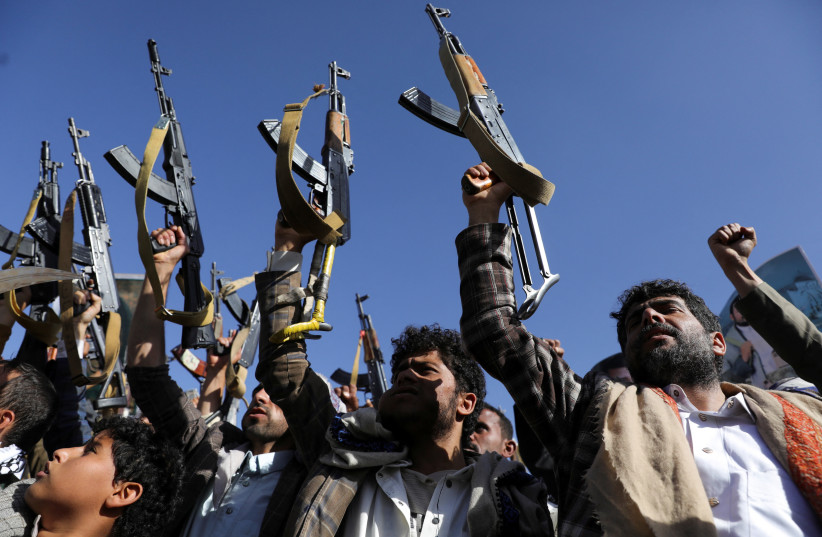Houthis ban music and singing in weddings
The Houthi militia forces in the Amran Governorate of Yemen have been conducting a large-scale campaign of intimidation against male and female artists to prevent them from performing and singing at venues and events.
Videos showing violent incursions of armed Houthi militants into venues and event halls, entailing arrests and abruptly ending the celebrations have been circulating on social media over the past weeks.
According to reports from Yemen, the militia has abducted more than 15 wedding hall owners, who have been held in pretrial detention for over two months, accusing them of refusing to pledge not to allow artists to perform in their venues. Other reports claimed that about 40 civilians were kidnapped by Houthi authorities, including two women, all of which are artists and owners of wedding halls.

The Iran-backed militia has reportedly imprisoned several artists along with their musical and audio equipment, especially since the appointment of a new governor named Nayef Abu Kharafshah in the northwestern governorate of Amran.
Notedly, the same Al-Kharafshah was documented attending an event which featured musical performances, leading an Al-Arabiya anchor to comment: “what is Halal for them is Haram for all others”.
In response, Yemeni bloggers launched an online campaign titled “why were they imprisoned?”, referring to the odd circumstances of the artists’ arrests. One user wrote: “Why did they imprison them? Does the Oud hold ISIS? They deliberately spoil even the joy of weddings and turn them into sadness and tragedy. If they were keen on the people’s money that they plundered and built villas with, this would not be forbidden.” While another one wrote: “But why do they imprison artists in Amran? Are their voices too loud, or do they not know how to play an oud or anything? Is Amran a state that has a special law that differs from other regions?”
This is not the first time that such arrests happened in the Houthi controlled areas of Yemen. In May, Houthi militia forces prevented a mass wedding of 160 brides and grooms in the city of Hababa in the Amran Governorate, also due to the presence of a singer. Houthi militants also reportedly stormed touristic facilities in the city of Ibb and led to the closure of several hotels and restaurants. Additionally, local human rights organizations mentioned that roughly 600 citizens were “kidnapped” and are being held without trials in facilities in Sanaa and Saada.
‘A method of exerting control over the population’
Inbal Nissim Louvton, an expert on modern Yemen, lecturer at the Open University, and a research fellow at the Forum for Regional Thinking, explained that this ban was issued as part of an ongoing effort by the Houthi government to promote ‘appropriate behavior’ from a religious and moral point of view, but also to fasten the grip of the Houthis on the civilian population under their control, and even reap economic profit.
“From the beginning of the civil war in Yemen in 2014, the Houthis took control of various means of communication in the country and channeled them to their needs,” reminded Nissim Louvton. “As a first step they nationalized the official media channels and took over media bodies and gradually expanded their activities.”
According to Nissim Louvton, the current ban on singing and performances, which also included restrictions on shops which sell movies and music, is not at all new. “For example, in the summer of 2021, the Houthis banned singing and music performances at social events in the capital Sana’a and in other areas under their control. The local Houthi appointed governor Abd al-Basit Hadi, also issued a statement prohibiting men and women from appearing at weddings in the capital Sana’a,” she added.
“This is one of a series of measures taken by the Houthis by which they sought to enforce their interpretation of religious and moral codes. The closing of public places of entertainment, cafes and restaurants, the detaining and arrest of artists and the cancellation of cultural events and artistic activities – all of these were practices essentially no different from what al-Qaeda militants attempted to do in the past in Yemen.
“Al-Qaeda militants (named “Abna’ Hadramawt” the Sons of Hadramawt) have even come out against the common and accepted practice in Yemen of chewing gat and at the beginning of 2015 they banned the sale of the plant in various cities in southern Yemen. They distributed leaflets in which they imposed fines on those who would sell gat in the public space and even set fire to several shops in the Al-Mukhala area, the capital of Haderamwat district in the coastal area of southeastern Yemen.”
Nissim Louvton explained that from time to time the Houthis try to deepen their control by forcing their religious convictions through various restrictions. “Perhaps this is also an attempt to divert attention from their inability to manage the Houthi state they created or protect its citizens,” she added.
However, much like the Al-Arabia anchor noted above, Nissim Louvton explained that this ban doesn’t seem to apply for the Houthis themselves. “Houthi forces encourage store owners to promote music that glorifies the Houthis themselves and the war they have been waging for almost a decade, with the so-called ‘Zawamel’ genre. This is a tribal poetry used as a means of propaganda to promote Houthi influence among young people, recruit fighters and supporters and shape public opinion in their territories. In addition, they collect royalties and become main suppliers for stores and thus expand their independent economic network, which includes heavy and extensive taxation in their territories.”
Finally, Nissim Louvton added that another grim aspect of what is sometimes regarded as the “Taliban state model” of the Houthis includes various restrictions on the freedom of movement of women in the public space, the imposition of male guardianship on women and the activation of a sort of women’s police units that operate from 2017 in different regions, nicknamed the ‘Zainabiyat.’”





Comments are closed.